Can Dogs Eat Seaweed? [Dogs Eating Nori]
Whaaaat? A seaweed-eating dog? That’s a new one. That often dried, dark green, strong-tasting sea vegetable we find in a pack in most grocery stores, really?
While it may not be their first choice, dogs can safely eat seaweed. In fact, some types of seaweed are even good for them! Seaweed is a rich source of vitamins and minerals, including iodine, iron, and calcium, helping to improve digestion and cardiovascular health.
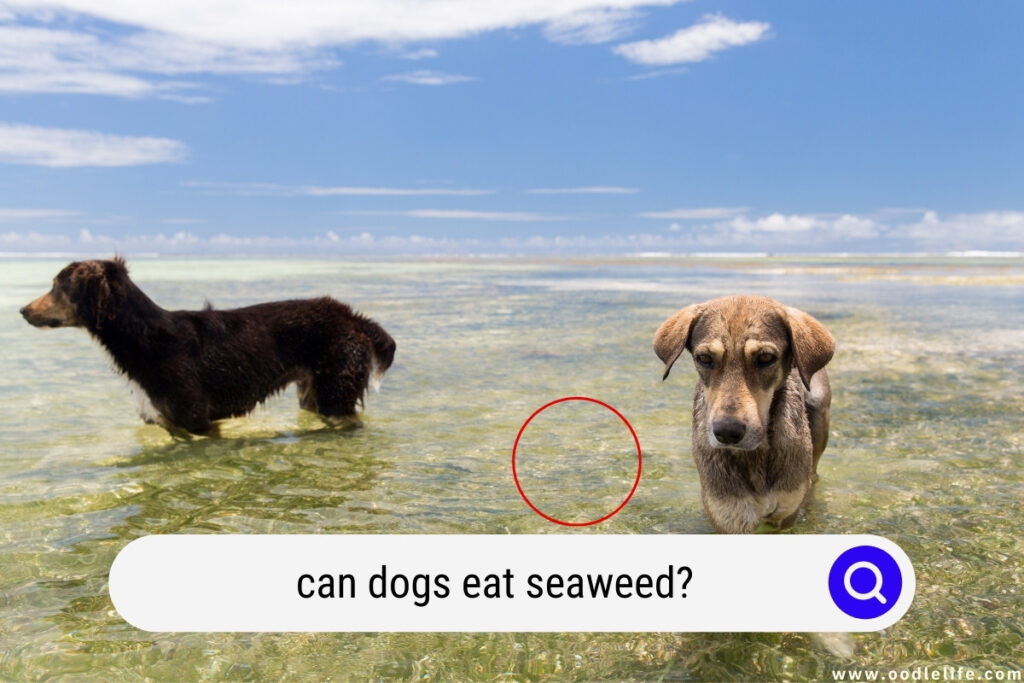
Of course, not all seaweed is created equal. Some types of seaweed are very high in salt, which can be harmful to dogs. Others may contain harmful toxins.
In this blog post, we’ll examine what seaweed is, its health benefits for your dog, and look more into the most popular type of seaweed, nori.
What Is Seaweed?
Seaweed refers broadly to the range of sea vegetables that come from different species of plants and algae that are naturally found in the water. Also known as marine plants, they grow in oceans, lakes, and rivers.
Black, red, green, and brown, seaweed is most commonly found on the shorelines in shallow water. These nutritious vegetables are usually anchored at the bottom of the water by structures similar to roots which are called holdfasts.
The difference between the holdfasts and the roots is that the holdfast acts solely as an anchor for the seaweed to hold it in place, and it doesn’t provide nutrients to the plant.
They come in a multitude of sizes. Some types of seaweed are so minuscule in size that you can barely see them such as the almost-microscopic phytoplankton species, while some are incredibly huge such as the giant kelp.
Seaweed also contains natural antibacterial and anti-inflammatory properties and has been used in the past to treat wounds and burns. This marine plant is rich in many nutrients and minerals such as calcium, vitamin K, and iodine.
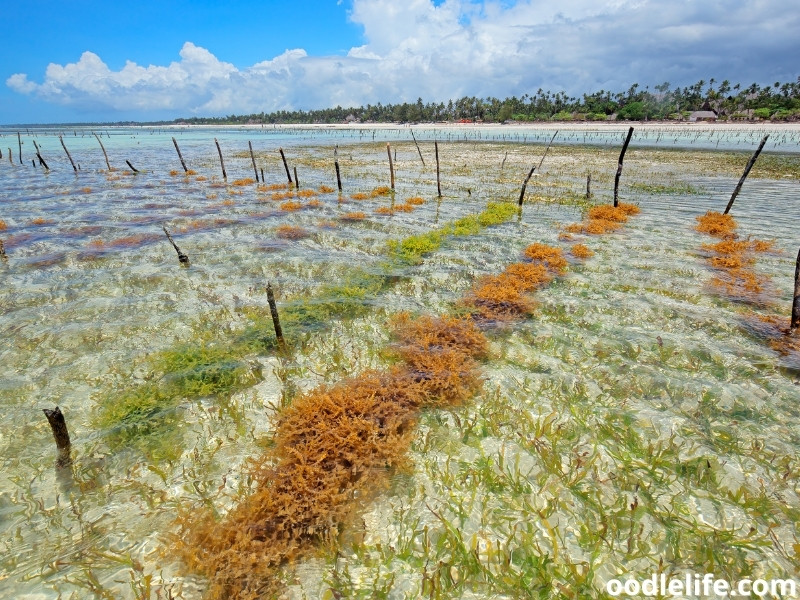
Is It Safe For Dogs To Eat Nori?
You know the dark green, dried seaweed that commonly wraps your sushi rolls? That’s nori, the most common type of seaweed found today.
Raw and unseasoned nori is completely safe for dogs to eat and is actually very nutritious for dogs because it is high in nutrients like omega fatty acids, iron and protein.
Some nori sheets are seasoned with salt, garlic, or onions, and should be avoided. Garlic and onions are members of the allium family that can cause digestive upsets in dogs. They contain a substance called thiosulfate and this is very toxic to dogs, who lack an enzyme that can digest these compounds.
In addition, too much salt can lead to sodium poisoning resulting in vomiting, diarrhea, and lethargy. Sodium poisoning can be serious, so keep those shakers away from your pooch!

Is It Safe For Dogs To Eat Seaweed At The Beach?
Even though seaweed is rich in many minerals and nutrients that are good for dogs, it is important to note that it is not safe for dogs to eat seaweed from the beach.
Jellyfish could be present in the seaweed and if consumed, there is a chance of your dog having an allergic reaction. Seaweed from the beach could also be polluted and there is a very high probability of salt poisoning.
Salt poisoning means there is excessive salt in the blood and this is called hypernatremia. Dogs can eat small amounts of salt and be fine but where there is excessive salt in their system it can cause serious consequences.
High levels of sodium in the blood cause dehydration because the tissues and muscles end up producing more fluid to balance out the sodium levels in the blood.
When excessive amounts of fluid have been lost it can cause stiffness in the muscles and your dog may struggle to walk. Another important point to note is that if there are high amounts of fluid lost in the brain it can also cause seizures.
Some symptoms of salt poisoning to look out for in dogs are:
- Extreme and constant urination
- Vomiting
- Diarrhea
- Stiff Muscles
- Loss of appetite

Nori Health Benefits for Dogs
There are numerous health benefits that nori provides for dogs:

Nori as a detoxifying agent
Detoxification is the process in which the body gets rid of harmful toxic substances. The combination of chlorophyll and other elements in nori makes it an excellent source for getting rid of harmful toxins from your dog’s body.
Nori is also packed with multiple antioxidants that help to balance the free radicals in their bodies, strengthening their immune system and ability to fight serious diseases such as heart disease and cancer.
Aid thyroid function
Nori aids in the support of a healthy thyroid system and this is because it contains significant amounts of iodine which is a major nutrient that is needed to help the thyroid function properly.
Not having enough iodine prevents the thyroid from producing enough of the thyroid hormone called thyroxine which can, in turn, cause hyperthyroidism.
Strengthens immune system
Nori is a superb immune system booster due to its high number of nutrients. The combination of vitamins and minerals works together to improve the body’s ability to resist infections and fight diseases.
Improves skin
Nori encourages better skin conditions and decreases itchiness in dogs. A lot of dogs tend to have itchy and irritated skin due to allergies. Nori helps to reduce skin inflammation and improve the shine of your dog’s coat.
Improves digestive system
Nori has a high fiber content which encourages healthy bowel movements, prevents constipation, and helps with digestion. Fiber moves through the system undigested and then settles in the colon, where it stays there and feeds the trillions of healthy bacteria in the gut called probiotics.
The main responsibilities of probiotics is to strengthen the immune system, maintain digestive health, and fight off bad bacteria.
Is It Safe For Dogs To Eat Other Seaweed?
Considering that seaweed has so many advantages and health benefits for your dog, it is safe for dogs to eat other types of seaweed other than nori. There are many different types of edible seaweed. Some of these are:
Kelp
This type of seaweed has some of the most benefits for dogs. Kelp provides up to 60 different sources of nutrients and 21 amino acids.
Since kelp is very high in protein it aids in the tissue development and repair of muscles. It supports healthy glands by controlling gland activity in the thyroid and pituitary glands. Kelp is also great for any kind of allergies, itchiness, or inflammation that may affect your dog’s skin.
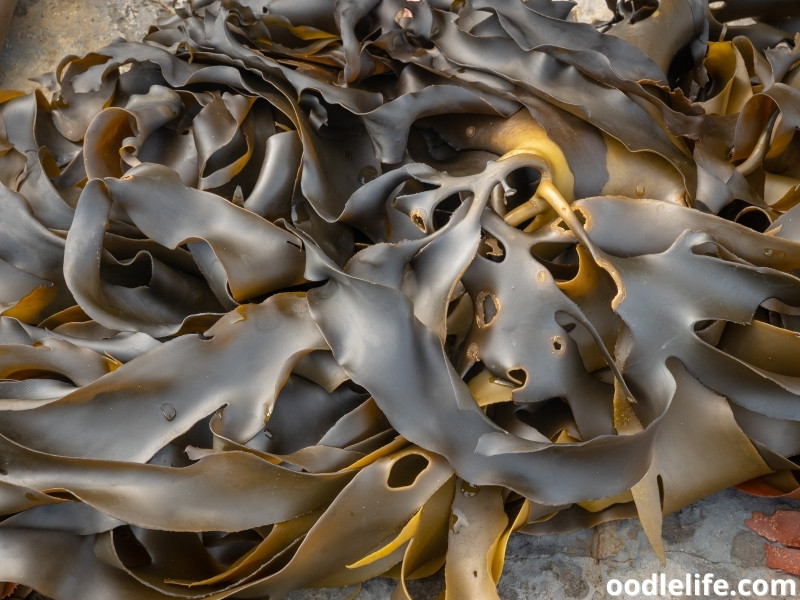
Irish moss
This type of seaweed has a gel-like texture and is also referred to as sea moss. It is commonly used as an additive that retains the quality of some foods as well as a food thickener for texture.
Irish moss is nutrient-rich with numerous health benefits such as benefiting the respiratory system and promoting lung health. Irish moss can be added to broths or combined with commercial dried kibble.
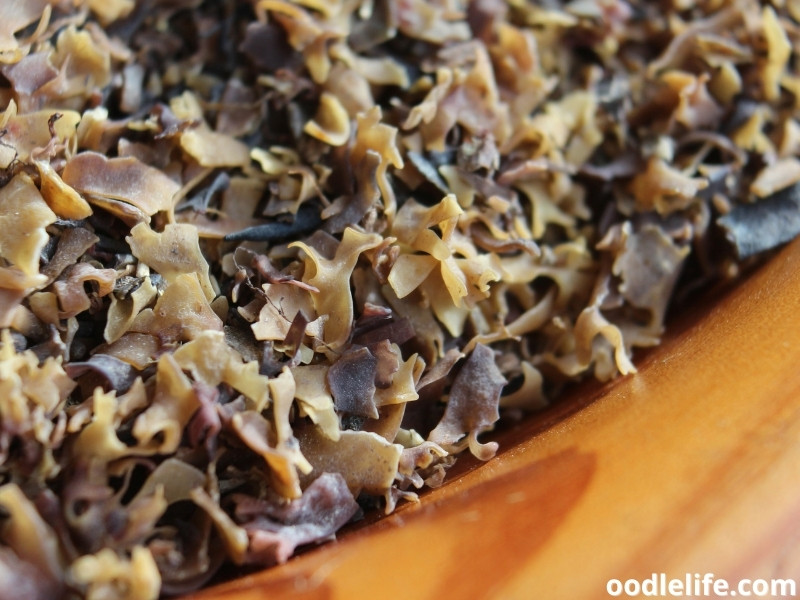
Wakame
This seaweed is commonly served as a side dish to your sushi. While it can be pickled in salt and vinegar, it can also be served raw. Low in calories and high in antioxidants, it is great for regulating blood pressure, controlling sugar levels, and lowering cholesterol.
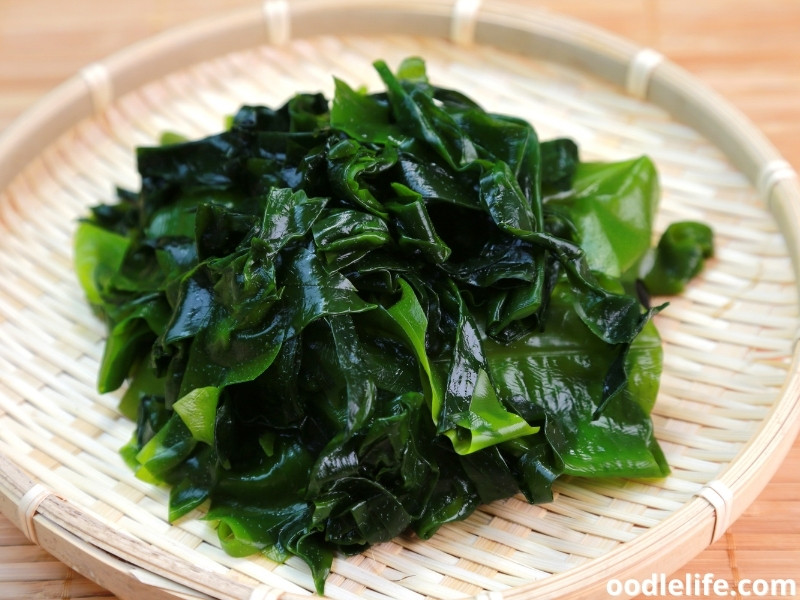
What Happens If Your Dog Eats Too Much Nori?
Although nori is a great superfood that is super beneficial for dogs, they should not consume excessive amounts of nori as there may be potential side effects.
When adding seaweed to your dog’s diet there are certain things to be aware of to prevent potential risks.

Hyperthyroidism from iodine
Nori contains loads of iodine, and when eaten excessively, it can have a negative effect on the thyroid gland and cause hyperthyroidism. In addition, dogs can have allergic reactions to excessive levels of iodine.
Hyperthyroidism in dogs happens when there is an excessive amount of the hormone called thyroxine. Some signs of hyperthyroidism to look out for in dogs are:
- The area under your dog’s neck is swollen.
- Dramatic weight loss.
- Swallowing difficulties.
- Excessive drinking and increased thirst.
Digestive issues from the fiber
Fiber helps to add bulk to stool, which makes it easier to pass through the intestines. In addition, fiber helps to keep the digestive system clean and free of debris.
However, too much fiber can actually lead to digestive problems. When there is more fiber than the body can process, it can cause bloating, pain, and gas. In addition, unprocessed fiber can collect in the colon and cause constipation.
Heavy metals in seaweed
Because seaweed is a marine plant that is vulnerable to the environment, it can absorb chemicals present in the water like heavy metals. This can potentially cause toxic effects if ingested at high concentrations over long periods.
Final Thoughts
So what’s the verdict? Can dogs eat seaweed? The answer is a resounding YES! Seaweed is not only safe for dogs to eat but it’s also packed with nutrients that can benefit their health.
As long as your dog enjoys eating seaweed and you don’t give them too much, there’s no reason why they can’t enjoy this healthy snack every day.